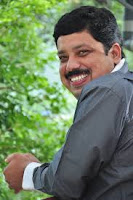Read up, Anand Neelakantan, author of 'Rise of Kali : Duryodhana's Mahabharata' (Part 2). We find out what the most challenging part of writing it was, the answer is incredible, as you get the most out of writing of the Gita.
How he thinks characters are more important, and a little about his favourite authors and future books and also about the TV show, Folks...
What was the most challenging part about writing both parts, now that
they are done?
Critically
analyzing Gita was the toughest part. I have been learning
Gita from the age of
5. It is a part of my belief system. But when I write Mahabharata from
Duryodhana’s side, I have to critically see Gita and it is very tough task.
 |
| Anand Neelakantan |
Subconsciously, I kept answering my own questions, just as I have been answering
the doubts of many of my friends who care to ask me doubts on the Gita for so many
years.
I overcame it by writing down arguments from either side without pausing
to think too much. The result was
surprising, as I found that the stock replies that many Gita scholars or even a
layman like me who attempts to answer the doubts on Gita give are really not
that logical and there are many questions that remain unanswered.
 I have put
them across in the book. Gita is dealt in three parts, 1 - as conversation
between Suyodhana and Krishna, 2 - between
Balarama and Krishna and 3 - between Arjuna and Krishna, each attempting to
answer the questions raised in the previous chapters.
I have put
them across in the book. Gita is dealt in three parts, 1 - as conversation
between Suyodhana and Krishna, 2 - between
Balarama and Krishna and 3 - between Arjuna and Krishna, each attempting to
answer the questions raised in the previous chapters.
If the reader ends up
with more questions than answers at the end of the book, I will consider my
attempt a success.
How much of your
thoughts and feelings are included in your books?
My writing is thinking aloud and
making the readers to feel for my characters, along with me.
Authors have different ways of telling their story, with elements that
are most important. Between your storyline and your characters, which takes
precedence?
Characters -
I do not plot for novels, but let the characters decide the course. I write in
a flow, often allowing the characters to possess me while I write.
As far as TV writing is concerned, detailed
plotting is required. I am writing Sita’s Ramayan for Star TV now.
Who are your
favourite authors and why?
 |
| Charles Dickens |
For characterization - Leo Tolstoy and Charles Dickens, for plotting - Ken Follet and Frederick Forsyth, for sub
text and depth - Somerset Maugham, for intuitive writing - Stephen King, for
humour - P G Wodehouse, for mystery -
Agatha Christie, for depth of thoughts - Fyodor Dostoyevsky, for counter telling -
Bhasa, SL Bhyrappa and M T Vasudevan Nair, for language - Salman Rushdie, for simplicity -
R K Narayan, for imagination - JRR Tolkien, for dark humour- Joseph Heller. The list
is endless. I read all genres.
How do you think
your book was different from everyone else’s besides it being about the
‘defeated’?
I don’t know. I have not
gone for comparisons with other popular authors. That is for the reader to
decide. I write what I know and in the
way I know.
How is ‘Amatya’, coming along?
As of now, I am writing
'Devayani', a young adult fantasy. 'Amatya' is after that.
I am also planning nonfiction
self-help book based on ancient Lokayutta philosophy, apart from 'Devayani' and
'Amatya'.
Which book are you
reading, currently?
Aarachar (Malayalam) by KR Meera.
You can Read the Reviews of 'Rise of Kali' here and 'Roll of the Dice' right here.
You can also check out the First Part to this Interview, right here.
You can also Buy the Book here.


No comments:
Post a Comment